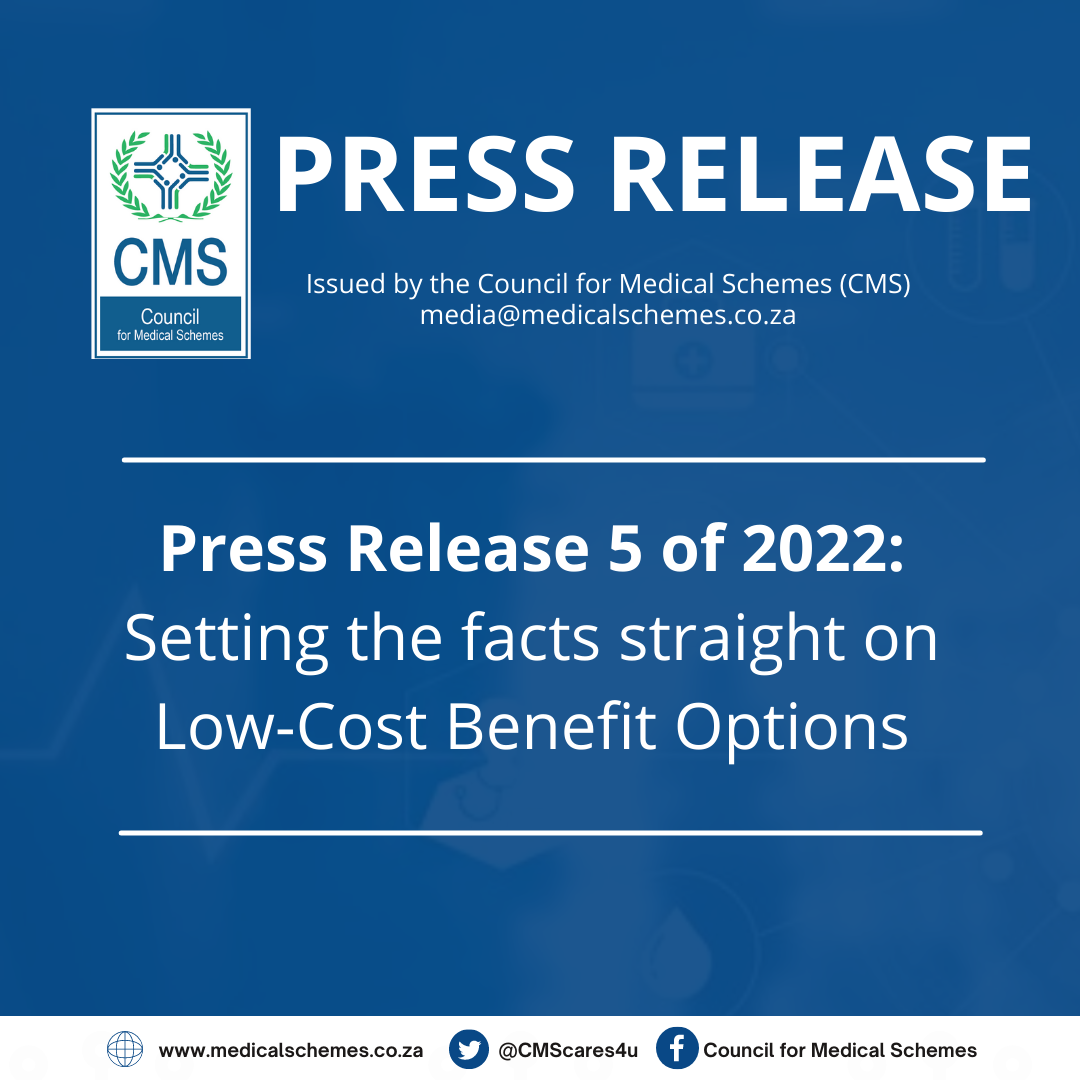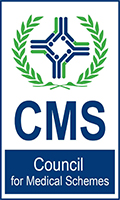
Press Release 5 of 2022: Setting the facts straight on Low-Cost Benefit Options
The Council for Medical Schemes (CMS) has taken note of the irresponsible assertions by Low-Cost Benefit Option (LCBO) Advisory Committee member and chair of the Benefit Design, Product and Pricing workstream, Mr Christoff Raath from Insight Actuaries and Consultants. The presentation, titled ‘Increasing access to financial risk protection implementation’ was delivered at the Board of Health Funders (BHF) conference in Cape Town on Thursday, 19 May 2022.
Mr Raath’s presentation was riddled with conjectures that were rather regrettable from someone of his position and expertise. What is more alarming is Mr Raath’s lack of regard for the structure that he himself is a participant of – the LCBO Advisory Committee. Participation in the LCBO Advisory Committee is voluntary, and members sign a Charter and Code of Conduct, guiding documents that ensure the sanctity of the process. Mr Raath has had ample opportunity to address his misgivings about the process, at committee level and to CMS management, but has decided to air his misgivings in the form of a publicity stunt.
The CMS has taken a dim view of this conduct and is currently examining this against the approved code of conduct and will be taking the appropriate action to preserve the integrity of the advisory committee and its work. Mr Raath’s conduct undermines the tireless work of many industry stakeholders who are committed to seeing the process through. This unwarranted behaviour smells foul of a profit-driven stance that seeks to generate profits at the expense of medical scheme members. The CMS remains resolute in ensuring that low-income earners have access to quality healthcare that is regulated effectively and complies with provisions of the Medical Schemes Act (131 of 1998).
Contrary to what was presented, the work of the advisory committee is continuing in earnest and is by no means complete. Once the framework and position paper has been finalised, it will be sent to CMS Council and then to the National Department of Health for approval. The framework is expected to pronounce on the future of the currently exempted primary insurance products and respond to the need to provide a low-cost option by medical schemes. This framework will also spell out the exceptional circumstances that will be considered in formally allowing these products into the market under the auspices of the Medical Schemes Act (131 of 1998).
CMS’ consultation of all stakeholders should neither be vilified nor undermined as it is in the quest to ensure that the final outputs enhance the quality of care for members and that no stakeholder is left behind. Over the duration of the project, the CMS has received inputs from consumer groups, doctors, unions, and brokers amongst others. It would be amiss of the CMS to scupper those who contribute meaningfully to the process just to appease the loudest voice in the room.
Industry engagements will continue, and as such, the next scheduled joint advisory committee meeting is in June 2022.
The claim that 20 million lives of low-income households would benefit from cover is overstated. The Market and Affordability workstream, which is one of the four workstreams of the LCBO Advisory Committees, estimates between 2.3-4 million of the expected LCBO target market (see Table 1 below).
Table 1: Medical scheme coverage and expected LCBO take-up rates across lower-income individuals
| Income bracket* | Average income | No of individuals | % on medical scheme | Expected LCBO take-up | Expected LCBO market |
| No income | R- | 3,743,230 | 4.3% | 2% | 74,865 |
| R1 – R1,081 | R541 | 11,612,543 | 2.3% | 1% | 116,125 |
| R1,082-R2,162 | R1,622 | 12,250,698 | 2.9% | 1% | 122,507 |
| R2,163 -R3,244 | R2,704 | 6,008,707 | 6.8% | 2% | 120,174 |
| R3,245 -R6,489 | R4,867 | 9,230,164 | 4.4% | 3% | 276,905 |
| R6,490 -R8,652 | R7,571 | 3,297,487 | 10.9% | 5% | 164,874 |
| R8,653 – R10,815 | R9,734 | 2,528,740 | 18.0% | 15% | 379,311 |
| R10,816-R12,978 | R11,897 | 1,644,133 | 22.6% | 20% | 328,827 |
| R12,979 -R18,386 | R15,683 | 2,860,013 | 38.1% | 25% | 715,003 |
| Total | 53,175,715 | 7.3% | 4.3% | 2,298,591 |
Source: Finscope 2018, *Income brackets have been adjusted for inflation to 2020 terms.
An assertion that the removal of the current tax credits for scheme members and the requirement to comply with the currently guaranteed Prescribed Minimum Benefits (PMBs) to create a new market of between 10 and 20 million versus the current 8,9 million members is too ghastly to contemplate. To further suggest that this new market should be exempted from complying with certain provisions of the Act in perpetuity undermines the role of CMS as a regulator.
The pillars of medical schemes are open enrolment, community rating, and, most importantly, the PMBs. PMBs ensure that all medical scheme members have access to a guaranteed, defined, fully funded, minimum package of health services, regardless of the benefit option they have selected. This guarantee ensures scheme members enjoy legislated protection from funders for these defined services. It is this guaranteed legislated protection that Mr Raath wishes to take away from the potential 10-20 million members and offers nothing in its place.
The assertion that PMBs are unwanted is untrue. Without a prescribed minimum package, millions of medical scheme members would be exposed to inferior cover in a country emerging from a major pandemic, an unmanageable burden of TB, HIV and AIDS, and an increasing prevalence of non-communicable diseases. Mr Raath has not made a convincing case of how the overall health outcomes of the health sector will be best served by providing a cover that promises far less for low-income earners.
The CMS will continue to ensure that all lives in the medical schemes industry are protected from inferior cover.
Download the Press Release here.
/Ends/
Issued by:
Dr Sipho Kabane
Chief Executive and Registrar
Council for Medical Schemes


